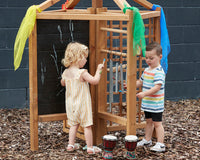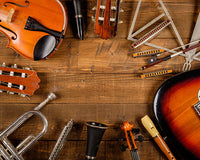When looking at microphone options, one of the first things you’ll come across is whether you’ll need a
Dynamic or
Condenser microphone. There are many technical specifications that make them different. But, to put in simple words, the main differences are as follows...
Main applications
 Dynamic microphones
Dynamic microphones have been a mainstay for live music for decades. They are commonly seen used by
singers, or used to mic up
guitar/bass amps or drums. This is because Dynamic microphones can handle a louder signal without clipping or causing feedback. When on stage with numerous sources of noise, this is ideal. But it does mean that if you are using a microphone to talk or sing without experience, it can come out quiet. I’m sure many people have heard wedding speeches that consist of volume drops and unclear words due to this!
 Condenser microphones
Condenser microphones are a lot more sensitive. This means that for recording they are ideal as they can pick up a more accurate representation of the sound. For live use, they are often used for
cymbals or
pianos. A very common use for a condenser microphone would also be for presentations or assemblies. These microphones mean you can just talk without worrying about microphone technique too. With this, Condenser mics do need to be powered. This is usually done through what is called “Phantom Power”, and most mixing desks or recording interfaces have this.
Generally, I tend to suggest that dynamic microphones are ideal for live music, or recording loud instruments. Condenser microphones excel in the studio, or for spoken word situations.
Durability
Dynamic microphones are, generally speaking, very tough. People will be using the same microphone for years which have dents and chips and they’ll still be going strong. I know I’ve dropped countless Dynamic microphones and never once has one stopped working.
Condenser microphones, while not flimsy, are a bit more delicate. This is due to how they are made, they will still last a long time but will require a bit more care. Though, this mostly applies to larger condenser microphones. Smaller lapel microphones will be more durable.

The main thing to think about when looking at Dynamic VS Condenser microphones, isn’t whether one is better than the other. You need to look at what you need. For example, a school who has large assemblies and no live music will be more suited with a condenser lapel mic. Whereas, a school which often put on orchestra or band performances might be better suited with dynamic, or even a mix. But it’s best to get what is right for what you need.
 Dynamic microphones have been a mainstay for live music for decades. They are commonly seen used by singers, or used to mic up guitar/bass amps or drums. This is because Dynamic microphones can handle a louder signal without clipping or causing feedback. When on stage with numerous sources of noise, this is ideal. But it does mean that if you are using a microphone to talk or sing without experience, it can come out quiet. I’m sure many people have heard wedding speeches that consist of volume drops and unclear words due to this!
Dynamic microphones have been a mainstay for live music for decades. They are commonly seen used by singers, or used to mic up guitar/bass amps or drums. This is because Dynamic microphones can handle a louder signal without clipping or causing feedback. When on stage with numerous sources of noise, this is ideal. But it does mean that if you are using a microphone to talk or sing without experience, it can come out quiet. I’m sure many people have heard wedding speeches that consist of volume drops and unclear words due to this!
 Condenser microphones are a lot more sensitive. This means that for recording they are ideal as they can pick up a more accurate representation of the sound. For live use, they are often used for cymbals or pianos. A very common use for a condenser microphone would also be for presentations or assemblies. These microphones mean you can just talk without worrying about microphone technique too. With this, Condenser mics do need to be powered. This is usually done through what is called “Phantom Power”, and most mixing desks or recording interfaces have this.
Generally, I tend to suggest that dynamic microphones are ideal for live music, or recording loud instruments. Condenser microphones excel in the studio, or for spoken word situations.
Condenser microphones are a lot more sensitive. This means that for recording they are ideal as they can pick up a more accurate representation of the sound. For live use, they are often used for cymbals or pianos. A very common use for a condenser microphone would also be for presentations or assemblies. These microphones mean you can just talk without worrying about microphone technique too. With this, Condenser mics do need to be powered. This is usually done through what is called “Phantom Power”, and most mixing desks or recording interfaces have this.
Generally, I tend to suggest that dynamic microphones are ideal for live music, or recording loud instruments. Condenser microphones excel in the studio, or for spoken word situations.
 The main thing to think about when looking at Dynamic VS Condenser microphones, isn’t whether one is better than the other. You need to look at what you need. For example, a school who has large assemblies and no live music will be more suited with a condenser lapel mic. Whereas, a school which often put on orchestra or band performances might be better suited with dynamic, or even a mix. But it’s best to get what is right for what you need.
The main thing to think about when looking at Dynamic VS Condenser microphones, isn’t whether one is better than the other. You need to look at what you need. For example, a school who has large assemblies and no live music will be more suited with a condenser lapel mic. Whereas, a school which often put on orchestra or band performances might be better suited with dynamic, or even a mix. But it’s best to get what is right for what you need.




















